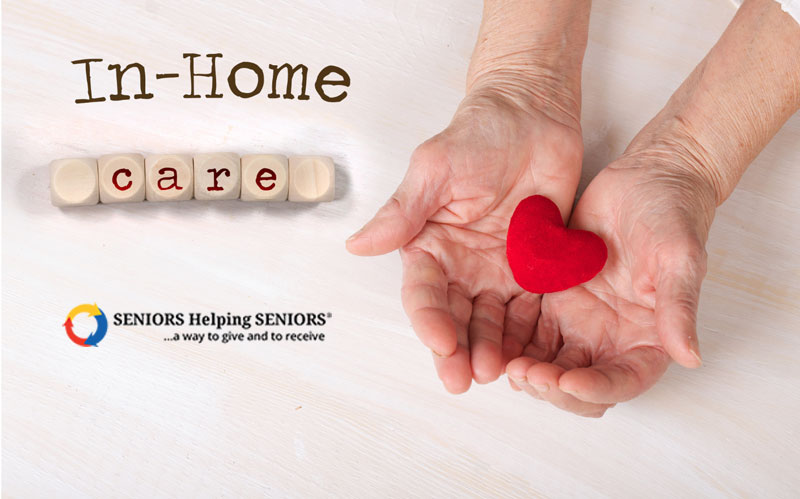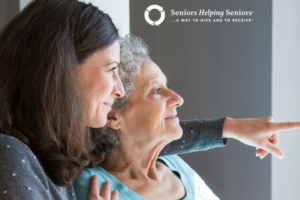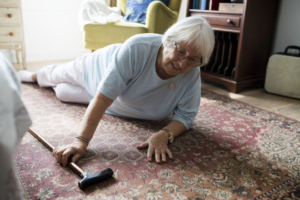Is It Time to Consider In-Home Care? 5 Signs Your Loved One May Need Help

A compassionate guide for families who are beginning to notice changes and wondering when it’s time to step in.
Time to read: 5 minutes
Why This Question Matters
One of the most difficult decisions families face is knowing when to seek help for an aging parent or loved one. The signs are often subtle at first: missed medications, an unkempt home, or growing isolation. You may wonder if these are normal parts of aging or indicators of something more?
The truth is, recognizing the right time to explore in-home care can prevent bigger health and safety issues later on. In this post, we’ll share 5 key signs that it may be time to consider support and how Seniors Helping Seniors® offers a gentle, dignified approach to in-home care.
1. Difficulty with Daily Activities
Is your loved one struggling with tasks like cooking, bathing, dressing, or keeping up with laundry? These activities of daily living (ADLs) are essential for health and dignity. When they become difficult, it may indicate that some assistance is needed at home.
How We Help:
Seniors Helping Seniors® provides gentle support for these daily routines—always with the goal of empowering independence, not replacing it. Our caregivers are seniors themselves and understand the value of maintaining autonomy.
2. Noticeable Changes in Personal Hygiene or Appearance
If you notice your parent is wearing the same clothes multiple days in a row, skipping haircuts, or no longer bathing regularly, this could be a red flag. Often, seniors don’t want to admit they’re having trouble or they may fear losing their independence.
How We Help:
Our team provides respectful, discreet hygiene support, helping with bathing, grooming, and dressing in a way that preserves dignity and builds trust over time.
3. Increasing Forgetfulness or Missed Medications
Occasional forgetfulness is common, but consistent memory lapses, unopened mail, missed medications, or confusion over appointments could suggest cognitive decline or early-stage dementia.
How We Help:
While we don’t provide medical care, we offer reliable medication reminders, schedule management, and companionship that helps reduce confusion. We also keep family members informed through real-time updates via our ClearCare Family Room portal.
4. Isolation and Lack of Social Engagement
Social isolation is a growing health crisis among seniors. If your loved one is spending most of the day alone, losing interest in hobbies, or withdrawing from friends and family, their emotional health may be at risk.
How We Help:
Our caregivers don’t just show up, they build relationships. Whether it’s chatting over coffee, going for a walk, or attending a community event, we offer genuine companionship that keeps seniors engaged and connected.
Stat Reference: A study from the National Institute on Aging links isolation to higher risks of depression, cognitive decline, and even heart disease.
NIA – Loneliness and Social Isolation
5. Safety Concerns at Home
Are there unexplained bruises or minor falls? Is the stove left on? Are there signs that your loved one is no longer managing their home safely? Even one fall can lead to serious complications for seniors.
How We Help:
We assess each home for safety risks and support mobility, household tasks, and fall prevention strategies. Our caregivers also act as an extra set of eyes, ensuring early intervention before accidents occur.
What Happens If You Wait Too Long?
Delaying in-home care can lead to hospitalizations, injuries, or premature moves to assisted living. The earlier you introduce help, the more your loved one can participate in decision-making—and get used to the idea of care in a positive way.
How Seniors Helping Seniors® Makes It Easier
Our mission is to make the idea of receiving help feel natural, friendly, and empowering. We match each client with a senior caregiver who shares similar interests and values, offering support that feels more like a visit from a friend than a formal service.
We start with a free in-home consultation to understand your family’s needs and offer guidance—even if you’re not ready for care right away.
Key Takeaways
- Changes in hygiene, memory, safety, or social interaction may signal that in-home care is needed.
- Early intervention prevents crisis situations and helps your loved one maintain dignity and independence.
- Seniors Helping Seniors® provides compassionate, peer-to-peer in-home care tailored to your family’s comfort and schedule.
- Our transparent communication, flexible options, and mature caregivers make getting help feel easier—for everyone.
Suggested Resources
- National Institute on Aging – Signs Your Parent May Need Help
- AARP Caregiving Resource Center
- Family Caregiver Alliance – California Resources






